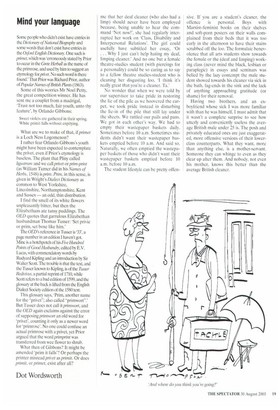Mind your language
Some people who didn't exist have entries in the Dictionary of National Biography and some words that don't exist have entries in the Oxford English Dictionary. One such is prirnet, which was 'erroneously stated by Prior to occur in the Give Herball as the name of the primrose, and used by him to suggest an etymology for privet. No such word is there found: That Prior was Richard Prior, author of Popular Names of British Plants (1863).
Some of this worries Mr Noel Petty, the great competition winner. He has sent me a couplet from a madrigal, 'Trust not too much, fair youth, unto thy feature', by Orlando Gibbons:
Sweet violets are gathered in their spring. White primit falls without enpitying.
What are we to make of that, if primet is a Loch Ness Logomenon?
I rather fear Orlando Gibbons's youth might have been expected to contemplate the privet, even if Prior's etymology is baseless. The plant that Pliny called ligustrum and we call privet or prim-prim (as William Turner did in his Names of Herbs, 1548) is prim. Prim, in this sense, is given in Wright's Dialect Dictionary as common to West Yorkshire, Lincolnshire, Northamptonshire, Kent and Sussex — an odd, thin distribution.
I find the smell of its white flowers unpleasantly bitter, but then the Elizabethans ate tansy puddings. The OED quotes that garrulous Elizabethan husbandman Thomas Tusser: 'Set privie or prim, set boxe like him.'
The OED's reference in Tusser is '33', a page number in an edition I haven't got. Mine is a hotchpotch of his Five Hundred Points of Good Husbandry., edited by E.V. Lucas, with commendatory words by Rudyard Kipling and an introduction by Sir Walter Scott. The trouble is that the text, and the Tusser known to Kipling, is of the Tosser Redivivtis. a partial reprint of 1710, while Scott refers to a bad edition of 1599, and the glossary at the back is lifted from the English Dialect Society edition of the 1580 text.
This glossary says, 'Prim, another name for the "privet"; also called "primwort".' But Tusser does not call it primwort, and the OED again exclaims against the error of supposing primwort an old word for 'privet', counting it only as a newer word for 'primrose'. No one could confuse an actual primrose with a privet, yet Prior argued that the word primprint was transferred from wee flower to shrub.
What then of Gibbons? It might be amended 'prim it falls'? Or perhaps the printer misread privet as primit. Or does primit, or primer, exist after all?
Dot Wordsworth


























































 Previous page
Previous page